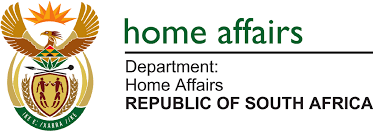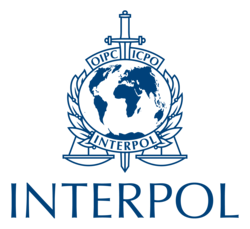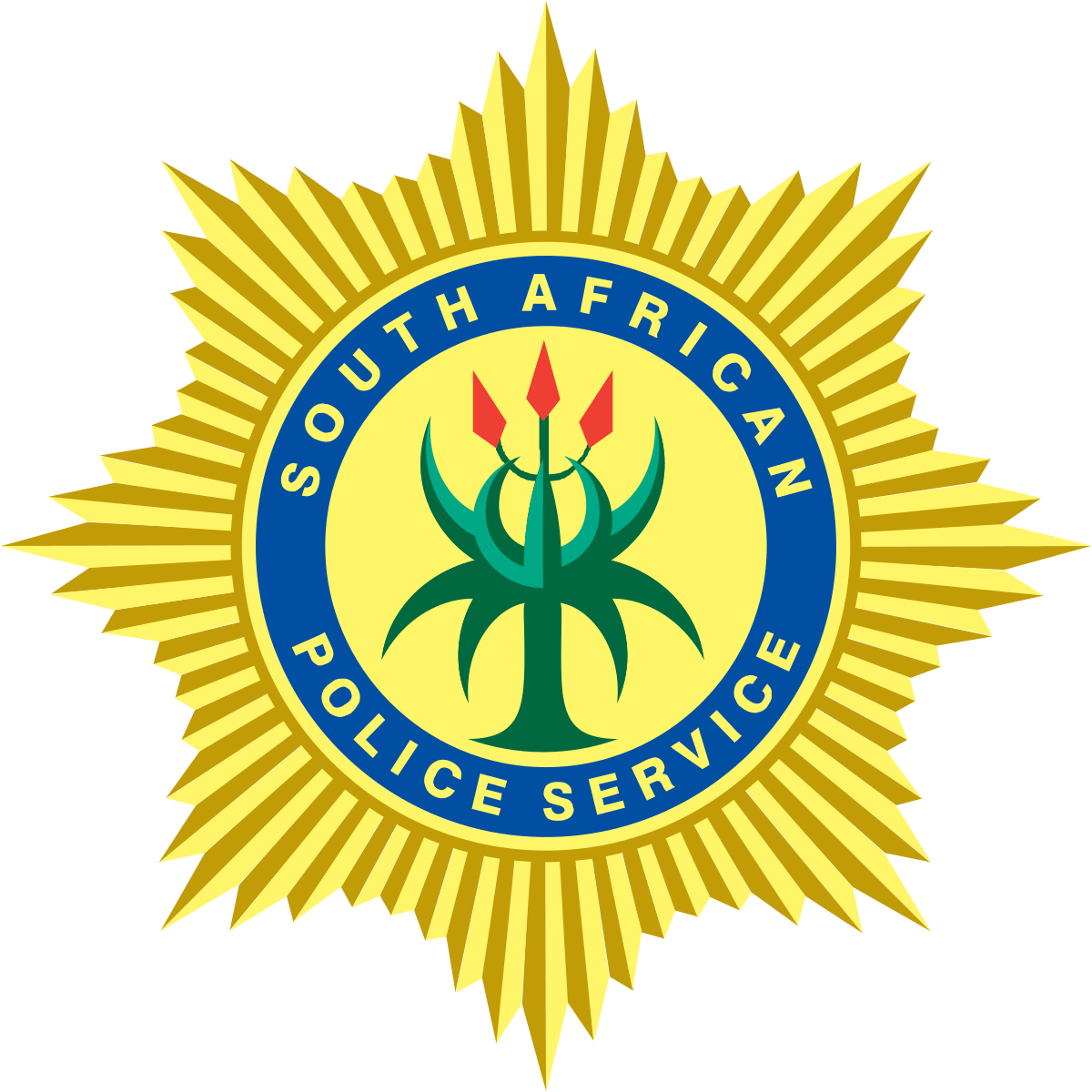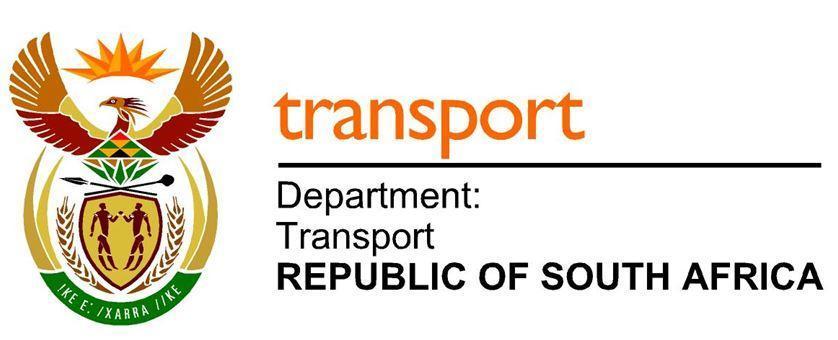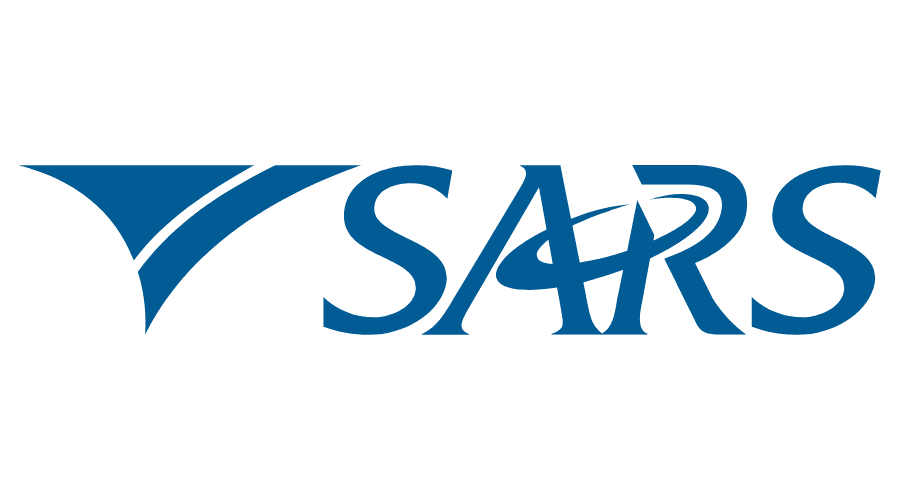URGENT NOTICE
The Legalisation Section is open for walk-ins. Opening times are 08:30 to 12:30 Monday, Tuesday, Thursday and Friday, excluding public holidays. A limited number of people can be accommodated each day. A register is available at Security at the main entrance with the appointments available for that day. Each person must carry his/her own documents and proof of identification is required. Agencies can continue using courier services. Parking inside the DIRCO building is only for people living with disabilities.
Consular Notarial Service: Legalisation of official (public) documents
Consular notarial services are rendered to South African citizens and foreign nationals requiring South African official (public) documents to be legalised for use abroad.
These services are rendered to provide legal validity to South African official (public) documents to enable a person to use the documents outside the Republic of South Africa.
Legalising documents means that official (public) documents executed within the Republic of South Africa for use outside the Republic of South Africa are affixed, sealed and signed either with an Apostille Certificate (where countries are signatory to the Apostille Convention) or with a Certificate of Authentication (where countries are not signatory to the Apostille Convention).
Legalisation therefore basically means the process followed by which the signature and seal on an official (public) document are verified.
Note: The full description of the Apostille Convention is The Hague Convention of 5 October 1961 (Abolishing the Requirement of Legalisation for Foreign Public Documents).
Please visit The Hague Conference on Private International Law – http://www.hcch.net/ for further information on signatory countries.
Note: South African diplomatic or consular representatives abroad can legalise official documents only if these were legalised by the relevant foreign competent authority in their country of accreditation, for use within South Africa. South African diplomatic or consular representatives abroad cannot issue apostille certificates, only certificates of authentication.
The DIRCO Legalisation Section provides the following services:
- Legalises official (public) documents executed within the Republic of South Africa for use outside the Republic of South Africa by means of an Apostille Certificate or a Certificate of Authentication.
- Provides customers with guidelines to obtain the correct signatures/documents, if documents submitted are incorrect or incomplete.
- Provides customers with information by telephone, mail and e-mail.
The document to be legalised is determined by the customer. Legalisation staff are not able to advise customers as to what documents they need to submit for i.e. foreign work/residence permits, application for foreign citizenship or registration of birth, or to obtain a foreign passport, etc.
Customers are therefore advised to contact the foreign representative in South Africa of the country in which the document will be used directly, to determine what documents they will need to submit and which documentation will be required for legalisation purposes and what their countries’ specific requirements are.
The Legalisation Section can issue the relevant Apostille Certificate or the Certificate of Authentication subject to the following rules:
- The customer needs to advise the Legalisation Section of the country in which the document will be used to enable the Legalisation Section to determine if an Apostille Certificate or Certificate of Authentication is required.
- The period of validity of the document has not expired.
- Refer to the important notes for additional guidance and information on the various different types of documentation.
- All foreign documentation must be legalised from the country of origin.
The following types original official (public) documents can be submitted directly to the Legalisation Section, provided the documents were signed and stamped by the relevant issuing authority, as listed below:
- The original unabridged or full birth, marriage and/or death certificates; original (valid) letters of no impediment (marital status); letter confirming an individual’s citizenship status (letters confirming naturalisation) and renunciation letters as issued and duly signed and stamped by the authorised Home Affairs official. (Refer to the “important notes” below for further guidance and information pertaining to these types of civic documentation.)
- The original (valid) Police Clearance Certificate as issued, signed and stamped by the South African Police Service (SAPS) – Criminal Record and Crime Scene Management [previously referred to as the Criminal Record Centre (CRC)]. (Note: A Police Clearance Certificate is only valid for six months from date of issue.
- The original adoption papers signed and stamped by the relevant Presiding Officer/ Commissioner of Child Welfare of the Children’s Court (Department of Justice and Constitutional Development) or the Registrar of Adoptions at the Department of Social Development.
- Original confirmation letters as issued (stamped and signed) by the Department of Transport – Road Traffic Management Corporation (RTMC), confirming that the applicant holds a valid driver’s licence. (Note: The Legalisation Section cannot legalise actual driver’s licences).
NOTE: Flow diagram: To follow the process as explained above (when the destination country is signatory to the Apostille Convention) – and when the Apostille Certificate will be issued and affixed:

(If the convention applies, an apostille is the only formality that is required to establish the origin of the public document – no additional requirement may be imposed to authenticate the origin of the public document.)
NOTE: Flow diagram: To follow the process as explained above (when the destination country is NOT signatory to the Apostille Convention) – and when the Certificate of Authentication will be issued and affixed:
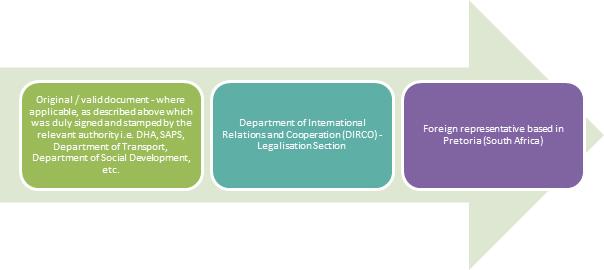
Important notes (pertaining to the types of official (public) documentation that may be submitted directly to the Legalisation Section)
- The following documents are not accepted by the Legalisation Section, i.e. abridged certificates or computer printouts (in other words a shortened version of the unabridged certificate). The reason for this is that an abridged certificate is simply a computer printout and it does not contain the signature and stamp of the issuing authority.
- The marriage certificate as issued by the marriage officer will not be accepted for legalisation purposes. If you wish the marriage certificate to be legalised, then the original unabridged marriage certificate, as obtainable from the Department of Home Affairs will be required.
- The Legalisation Section does not accept certified copies of i.e. birth, marriage, death certificates; police clearance certificates; letters of no impediment (marital status); proof of citizenship; travel documents or identity documents, etc.
- The Legalisation Section also does not accept documents, which were certified as a true copy of the original by a Commissioner of Oaths.
- “Old” documentation: Please take note that although the original document is an original and valid document, the signature of the official (or employee) who originally issued and signed the document might not be available on the DIRCO – Legalisation Section signature database, neither be obtainable from the specific government department, as the official (or employee) who originally issued and signed the document is no longer employed at the specific department, which makes it impossible for the Legalisation Section to legalise the “old” document at such a late stage. Therefore, it is advisable that the document should preferably not be older than one year. The Legalisation Section furthermore recommends that customers must also verify with the relevant foreign representative in South Africa what their specific country requirements are.
- A Letter of No Impediments (marital status) can be legalised if on an original, official Home Affairs letterhead, signed and stamped by the authorised Home Affairs official (Head Office only). (These documents are only valid for a period of six months from the date of issue.) Important: The Department of Home Affairs confirmed that the Letter of No Impediments (marital status) is issued, stamped and signed by the authorised official at Head Office of the Department of Home Affairs only. Letters issued by the Regional Home Affairs offices will not be accepted for legalisation purposes, as these were issued without authorisation.
Note: Documents which have been laminated will not be accepted for legalisation purposes.
- All original documentation regarding the registration of companies and of close corporations, registration of patent designs, trademarks and copyrights must first be stamped and signed (every page) by the relevant Registrar at the Department of Trade, Industry and Competition (DTIC) – Companies and Intellectual Property Commission Office (CIPC), who is authorised to sign documents for international purposes.
- Note: If the CIPC does not verify the original CIPC documentation, and only provides copies thereof, then the client will have to follow the route of the i.e. Public Notary/Registrar of the High Court.
Export-related documentation:
- Export documentation must be stamped and signed (every page) – by the authorised employee at the Chamber of Commerce and Industry.
- Please take note: The chamber will not certify government-issued documents i.e. food-inspection certificates, veterinary health certificates, halal certificates, etc. However, the chamber can issue a short letter on its letterhead to the effect that the chamber has examined the certificate, and that based on its examination of the certificate supplied, the information contained therein to be true and correct (and to include the “number of pages” of the attached documentation).
- This letter on the original letterhead of the chamber must be signed by the authorised employee, stamped with the chamber’s seal and placed on top of the original document concerned.
School and transfer certificates (Grades 1 – 11):
- School and transfer certificates: Primary and secondary school certificates (grades 1 – 11): The transfer card needs to be signed and sealed by the principal of the school and the education district director or deputy director. The principal of the school needs to provide a letter confirming that the pupil studied at the school. Thereafter, it should be taken to authorised officials at the Department of Basic Education (DBE), which will issue a confirmation letter for the DIRCO – Legalisation Section to legalise the accompanying documents.
- Secondary school certificates (Grade 12): The original Grade 12 certificate, together with a copy should be taken to authorise officials at the DBE for verification. Thereafter, the documents should be submitted to the DIRCO – Legalisation Section to legalise. (Refer to the section dealing with Umalusi, if you hold a relevant certificate, as listed below.)
Note: The Department of Basic Education (DBE) refers to the national department based in Pretoria (and not the various regional offices). Please refer to “Directory: Contact Information” for the relevant contact information.
Matric certificates:
- Umalusi certificates: Umalusi requires a certified copy of the document to be verified as well as a certified copy of the requestor’s identity document or passport. The certified copies may not be older than three months.
- These copies and proof of payment, as determined by Umalusi of the request for verification should be e-mailed to verification@umalusi.org.za or faxed to 012 349-1511.
- Banking details of Umalusi: ABSA; Lynnwood Ridge; Cheque Account; Account Number 1630145178; Branch code – 333845; Reference No. – EVODIR002L. The e-mail/fax must clearly indicate: VERIFICATION FOR THE DIRCO.
- The application must clearly state the embassy/country and the information of the requestor as follows: Embassy/High Commission/Consular name and address; name and surname; ID number; contact number; e-mail address; and contact person.
- Umalusi strives to ensure completion of the verification within a 24-hour working-day period.
- Once the request has been finalised, the requestor will be contacted to make arrangements for a courier service to collect the documents from the Umalusi offices and courier them to the DIRCO – Legalisation Section. (The cost of such courier service is payable by the requestor.)
- The requestor may also collect the documentation from Umalusi, per arrangement.
The qualifications verified by UMALUSI for this purpose are:
- Senior Certificate (schools)
- National Senior Certificate (schools after 2008/11)
- National Senior Certificate (Colleges – N3 subjects and two languages)
- National N3 Certificate
National Certificate (Vocational) – Levels 2, 3 and 4 - General Education and Training Certificate (ABET Level 4)
- subject statements/certificates and/or learning area certificates for the above qualifications.
Please note the following exceptions where Umalusi will not be in a position to do the verification:
- All certificates issued before November 1992 must be verified by the Department of Basic Education (DBE) (schooling qualifications).
- During the period between release of results and certification for Grade 12 learners – January to April for the November examination and January to August for those who have written the March supplementary examination, the verification of the statement of results will therefore be done by the DBE.
- In the event that the results have, for whatever reason, not yet been certified, the requestor will be referred to the DBE for verification purposes as Umalusi can only verify those records which have been certified.
- All primary and secondary school results (grades 1 to 11) are verified by the DBE.
- DBE will only be able to assist if the institution is registered with the department. It is therefore recommended to contact the DBE directly to verify if the institution is registered, before submitting your documentation.
- Note: The requestor will be referred to the relevant department in all instances mentioned above. DBE may have requirements that differ from those of Umalusi, therefore, in the event that the requestor is referred, please contact the relevant department for further information.
Tertiary qualifications:
- South African-issued tertiary qualifications need to be verified by the South African Qualifications Authority (SAQA).
- The original verification letter, as issued by SAQA, must be submitted for legalisation purposes. If you wish to include a copy of your degree with the legalisation process, SAQA must stamp and sign on the copy. (Note: For legalisation purposes, we require the copy that contains the original stamp and signature from the authorised employee of SAQA – the same employee who issued, stamped and signed the original verification letter.)
- SAQA assists with the stamping and signing on copies of the degree, if it confirms the following: The qualification title on the certificate must be the same as the registered title of the qualification on the SAQA National Qualifications Framework. Unfortunately, it frequently happens that institutions make up their own title for a registered qualification. In such cases, SAQA will confirm in the letter the qualification that the learner obtained BUT will not stamp and sign the certificate.
All applications must be sent to: verificationsletter@saqa.org.za.
Trade certificates:
The Skills Development Act, 1998 (Act 97 of 1998) as amended legislates the quality assurance functions for which the Quality Council for Trades and Occupations (QCTO) is responsible.
The qualifications verified for this purpose are:
- occupational certificates NQF Levels 2-8
- trade certificates under the following categories:
Trade certificates issued by the QCTO under the Skills Development Act – certificates issued from 1 November 2013 onwards; trade certificates issued under the Department of Employment and Labour, and the Department of Higher Education and Training; trainee certificates issued under Section 30 of the Manpower Training Act by the Department of Employment and Labour, and the Department of Higher Education and Training; trade certificates issues under the Black Builders Act; and replacement trade certificates issued by the QCTO.
Please note, the following exceptions where the QCTO will NOT be in a position to do the verification of a trade certificate: A trade certificate issued by a former Training Board or a Sector Education and Training Authority (SETA). For the authentication of these certificates, the applicant must follow the process i.e. Public Notary / Registrar of the High Court.
NOTE: The QCTO requires a certified copy of the document to be verified as well as a certified copy of the requestor’s Identity Document or passport. The certified copies may not be older than three (3) months. The requestor must ensure that before the fee is paid, the QCTO can indeed verify the type of certificate. These copies and proof of payment, as determined by the QCTO, of the request for verification should be e-mailed to verification@qcto.org.za
Banking details of the QCTO: ABSA; Mid Corporate Pretoria; Cheque Account; Account number 40 7837 0566; Branch code 632005; Reference No. DIRCO001. The e-mail must clearly indicate: VERIFICATION FOR DIRCO. The application must clearly state the embassy/country and the information of the requestor as follows: Embassy/High Commission/Consular name and address; name and surname; ID number; contact number; e-mail address; and contact person. The QCTO will strive to ensure completion of the verification within a 72-hour working-day period. Once the request has been finalised, the requestor will be contacted to make arrangements for a courier service to collect the documents from the QCTO offices and courier or deliver them to the DIRCO – Legalisation Section. (The cost of such courier service is payable by the requestor.) The requestor may also collect the documents from the QCTO office during working hours from 08:00 to 15:30 by arrangement.
Medical certificates
All medical certificates issued by a medical doctor after a medical examination on a patient needs to be stamped and signed (every page) by the authorised official at the Health Professions Council of South Africa (HPCSA). By stamping and signing the certificates, the HPCSA confirms that the medical doctor is a registered medical practitioner in South Africa. (Note: The Legalisation Section does not legalise actual x-rays. The results of the x-rays must be contained in the document issued by the medical practitioner, which should be stamped and signed by the HPCSA.).
- Documents pertaining to the transportation of livestock, including pets, should be stamped and signed by an authorised State Veterinarian.
Divorce decrees and settlement agreements
Customers should contact the High Court where the divorce was granted directly and make the necessary arrangements for a current Registrar or Assistant Registrar (not a clerk of the court or a registrar’s clerk) to sign and stamp the divorce decree and each page of the settlement agreement (should the settlement agreement be required), before submitting it to our office for legalisation purposes. Note: If the country of destination is signatory to the Apostille Convention, then the relevant High Court where the divorce was granted could in fact issue and affix the Apostille Certificate directly. In this case, the documentation must not be submitted to our office, as the rule will be applicable that if the convention applies, an apostille is the only formality that is required to establish the origin of the public document – no additional requirement may be imposed to authenticate the origin of the public document.
NOTE: The DIRCO – Legalisation Section does not take any responsibility for incorrect information provided, due to changes in the relevant authorities’ contact details; procedures; etc. It is therefore the responsibility of the customer to verify information directly with the relevant institution concerned.
NOTE: Flow diagram: To follow the process as explained above (when the destination country is signatory to the Apostille Convention) – and when the Apostille Certificate will be issued and affixed:

(If the convention applies, an apostille is the only formality that is required to establish the origin of the public document – no additional requirement may be imposed to authenticate the origin of the public document.)
NOTE: Flow diagram: To follow the process as explained above (when the destination country is NOT signatory to the Apostille Convention) – and when the Certificate of Authentication will be issued and affixed:

There may be other documents not listed above i.e. documents pertaining to customary marriages; travel documents (passport) or identity documents; or documents such as an affidavit or power of attorney; work contracts; and/ or translations, which have to be verified by a Public Notary (attorney registered with the High Court) or translated by a Sworn Translator (if this service is required), whereafter the verified documents must then be taken to the Registrar of the High Court of South Africa – in the same jurisdiction as the Public Notary or Sworn Translator, before submitting to the Legalisation Section:
- Step 1: Documents must be verified by a Public Notary (an attorney registered at the High Court) or translated by a Sworn Translator (if the customer wishes the documentation to be translated) of your choice. Note: The Public Notary will basically make a certified copy of the original document (which is the procedure, by which the copy of the original document, is “certified” as being “a true copy of the original document”).
- Step 2: The certified documents or translated documents must then be taken to the Registrar of the High Court of South Africa – in the same jurisdiction as the Public Notary/Sworn Translator. The Registrar will verify the signature and/or the seal of the Public Notary/Sworn Translator. (Note: Documents to be apostilled (for countries that are signatory to the apostille Convention) and authenticated (for non-signatory countries).
- Step 3: After authentication (for non-signatory countries) by the High Court, the documents must then be submitted to the DIRCO – Legalisation Section for further authentication.
Flow diagram: Process when following the route of the i.e. Public Notary/Registrar of the High Court (when the destination country is signatory to the Apostille Convention) – and when the Apostille Certificate will be issued and affixed
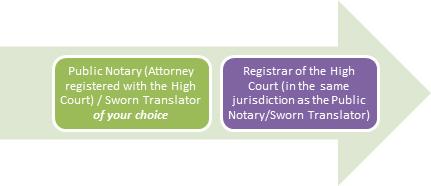
(If the convention applies, an apostille is the only formality that is required to establish the origin of the public document – no additional requirement may be imposed to authenticate the origin of the public document.)
Note: If a country is signatory to Apostille Convention, the High Court should issue and affix an Apostille Certificate to the document. This document should not be submitted to the DIRCO – Legalisation Section. If the convention applies, an apostille is the only formality that is required to establish the origin of the public document – no additional requirement may be imposed to authenticate the origin of the public document.
NOTE: Flow diagram: Process when following the route of the i.e. Public Notary/Registrar of the High Court (when the destination country is NOT signatory to the Apostille Convention) – and when the Certificate of Authentication will be issued and affixed:
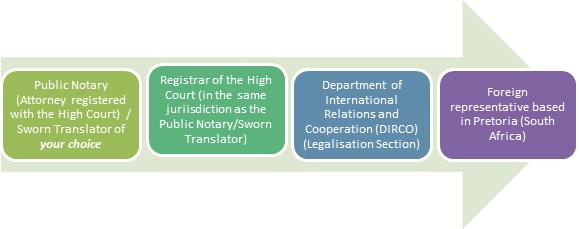
- The signature of a Notary Public, Justice of the Peace or any court employee who is not a registrar has to be legalised by a magistrate, additional magistrate or assistant magistrate or by a registrar or assistant registrar of any division of the High Court of South Africa within the jurisdiction of which such Justice of the Peace exercises his or her function or such Notary Public is in practice, before documents are submitted to the Legalisation Section for legalisation purposes.
- Documents must be bound together with the signature of the Registrar/Magistrate as the final signature of the first page, verifying the signature of the Public Notary or Justice of the Peace. The documents must be bound with a ribbon and red seal and the dry seal/stamp clearly visible on the document.
- A registrar can only verify the signatures of a) an attorney who is registered at the High Court as a public notary practising in the same jurisdiction of the relevant court or b) a sworn translator who is registered at the High Court in the same jurisdiction of the relevant court.
- The country of destination should be clearly specified to ensure the correct procedure is followed by the High Court.
- Copies of official documents signed by a member of the South African Police Service (SAPS) are not accepted.
URGENT NOTICE
The Legalisation Section is open for walk-ins. Opening times are 08:30 to 12:30 Monday, Tuesday, Thursday and Friday, excluding public holidays. A limited number of people can be accommodated each day. A register is available at Security at the main entrance with the appointments available for that day. Each person must carry his/her own documents and proof of identification is required. Agencies can continue using courier services. Parking inside the DIRCO building is only for people living with disabilities.
IMPORTANT: The DIRCO – Legalisation Section does not accept requests for personal submissions/walk-in customers. If you wish to submit documents for legalisation purposes, then you have two (2) options to submit i.e. either using a registered courier company (of your choice) to submit on your behalf; or via registered mail (Post Office). Please read the information below and follow the procedures, as clearly set-out on how to submit using either of the two (2) options provided.
Documents can be submitted to the Legalisation Section by one of the following means:
(Please take note that the addresses for submission of documents to the Legalisation Section differ, depending on the manner in which documents are submitted.)
Option 1: Submission via a registered courier service (of your choice):
Physical address: Department of International Relations and Cooperation (DIRCO), OR Tambo Building, 460 Soutpansberg Road, Rietondale, Pretoria, 0084 – Attention: Legalisation Section.
Requirements: Ensure that the cover letter (an example can be downloaded from our webpage) is included within the package. It has to indicate the following i.e. the country of destination, contact details, especially an e-mail address, in order to contact you/send you an e-mail notification once the process has been completed.
Note: DO NOT stick this cover letter on the envelope. Please include this cover letter inside the courier package with your documentation.
Click on the link below to download the cover letter:
Take note of the following before dispatching your parcel:
- All courier companies deliver strictly between 08:30 and 12:30 from Monday to Friday (except public holidays) to the Internal Mail Section that is based in the basement of the OR Tambo building.
- The staff from the Internal Mail Section will be signing for receipt of the said parcel and keep a register of all courier parcels received.
- This arrangement is only for courier companies, and all documentation must be secured in proper courier packaging and contain an airwaybill for track and trace purposes. If courier companies do not follow this protocol, the parcel will not be accepted at the Internal Mail Section.
- Your documentation will be processed and you will receive an e-mail notification from the Legalisation Section once the process has been completed. This e-mail notification will contain your specific reference number, as well as the procedure to be followed to make arrangements for collection via a courier service or you can opt for the choice to collect in person. It must be noted that the e-mail notification will only be forwarded once the documentation is completed (as per the processing times and procedures listed). Note: Check your SPAM folder, to ensure that you do not miss any communication from our office.
- The DIRCO – Legalisation Section receives large volumes of documentation from across the Republic of South Africa, as well as from abroad, therefore, it is requested to please be patient. You will receive an e-mail notification once the process has been completed and when the said documentation will be ready for collection. If you want to check if your parcel was in fact delivered, then the best option is to contact your courier company directly to verify accordingly. (Note: The courier company will be able to provide proof of delivery.)
- IMPORTANT: The customer will be responsible to provide protected materials/bubble-wrapped envelopes etc. for transportation purposes, or make arrangements directly with the courier company (of your choice) to provide such materials when delivering, to ensure the documentation is protected and not damaged during transportation.
Option 2: Submission by registered mail
Postal address: Department of International Relations and Cooperation (DIRCO), Attention: Legalisation Section, Private Bag X152, Pretoria, 0001.
Requirements: Include an A4-size self-addressed/pre-paid return envelope [registered mail] (no cash will be accepted), to allow the Legalisation Section to return the documents to the customer upon completion. Documents forwarded by mail must be accompanied by a covering letter, depicting the number of documents to be legalised, the country for which the legalisation is required as well as the full contact (telephone/e-mail) details of the sender.
Note:
- Please do not use fast mail or ordinary mail, as there is no tracking system available with the Post Office for these types of parcels, in order to track and trace your parcel.
- The customer must ensure that the correct current RSA Post Office rates for domestic deliveries are adhered to, and ensure that the correct value of stamps are placed on the return envelope. For further information and current rates, please visit the SAPO website – http://www.postoffice.co.za.
- It is recommended that customers based abroad not make use of normal postal services, but rather use a courier company or refer to option 4 (below) for submitting documentation, as the department will not be responsible for additional handling fees/charges resulting in requiring to clear the international item at customs/Post Office.
- No notification will be forwarded iro receipt or return to the customer via registered mail, however, you may track and trace your parcel by using your specific tracking numbers (incoming, as well as outgoing) directly with the Post Office. Refer to the Post Office website – Track my Parcel – https://www.postoffice.co.za/Tools/tracktrace.html.
Option 3: Submission via the South African Diplomatic or Consular Representative abroad:
Contact details: Refer to “Foreign Relations – South African Representation Abroad (Embassies and High Commissions)” for the relevant contact information.
Requirements: The mission must include a cover letter stating the country for which the document is needed.
Note:
- If you are residing abroad, the services of the South African Diplomatic or Consular Representative (embassy, high commission or consulate general) could be utilised – submit to the Mission for onward transmission via the diplomatic bag to the Legalisation Section (at Head Office). It is advised that the customer confirms directly with the relevant mission on the availability of the diplomatic bag to South Africa and vice versa, as well as to provide the customer with an estimated timeframe for sending and receiving the documents back at the mission.
- Unfortunately, this service is only applicable where documentation is to be submitted directly to the DIRCO – Legalisation Section. If you have a specific type of document, which has a verification step or steps before it should reach our office, then it would not be possible to use this option. In this case, it is suggested that customers rather use the option of a courier service or utilise the assistance of friends/family members in South Africa that will be able to assist with the verification process, before submitting to our office. (If this is applicable to you, please refer to option 1 for further information.)
Physical address:
Department of International and Cooperation (DIRCO), OR Tambo Building, 460 Soutpansberg Road, Rietondale, Pretoria, 0084 – Legalisation Section (ground floor).
- Collection from the DIRCO – Legalisation Section is strictly on an appointment basis. (No walk-in customers are allowed.)
- The customer will receive an e-mail notification (from collections@dirco.gov.za), which will also include the confirmation of appointment to collect from the Legalisation Section, only once the process has been completed and in fact ready for collection.
- TAKE NOTE OF THE FOLLOWING:
- Always check your SPAM/JUNK FOLDER to ensure that you do not miss any communication from our office.
- Print the notification/confirmation of appointment and bring along, as this must be provided to security, in order to confirm your appointment against the register of appointments for that specific day.
- The e-mail notification will be sent to the person whose name/surname appears on the cover letter and be send to the e-mail address as provided on the cover letter.
- The confirmation of appointment to collect will be made out in the name of the person whose name/surname appears on the cover letter.
- If the person whose name/surname appears on the appointment confirmation will not be collecting himself/herself, then this person will be responsible to provide a letter of authority to the relevant person or courier company, in order to be able to collect on their behalf. If a copy of the letter of authority is not provided, then the documents will not be handed-out/released.
Click on the link below to download the Letter of Authority:
There are three (3) options for collections:
- The customer may collect the documents themselves.
- The customer may send a family member or friend to collect on their behalf.
- The customer may make use of a courier company (of their choice) to collect the documentation on their behalf.
- Appointments will only be scheduled during our public hours, which are strictly from 08:30 to 12:30 (weekdays, except public holidays).
- Appointments are made on a first-come, first-served basis.
- Report to Security (main entrance) at least half-an-hour before the confirmed appointment time. This is to ensure that you reach the Legalisation Section on time for the appointment, as there are formalities to comply with to gain entry into the building and it is also a distance from the main security entrance to the Legalisation Section on the ground floor.
- If you missed your collections appointment for whatever reason, it will be required to re-schedule a new collections appointment. No special allowances or exceptions will be made.
- If you wish to re-schedule your collections appointment, then send an e-mail to collections@dirco.gov.za and provide your reference number and indicate that you missed your appointment and require a new date and time to be provided to collect your documentation from our office.
- Only the person who has a confirmed appointment will be allowed to enter. One person per appointment only.
- If you use a registered courier company (of your choice) to collect on your behalf, then you need to ensure that the courier company driver/representative bring along the relevant flyer/packaging/airway bills, etc.
- IMPORTANT: The customer will be responsible to provide protected materials / bubble-wrapped envelopes etc. for transportation purposes, or make arrangements directly with the courier company (of your choice) to provide such materials when collecting from our office. The DIRCO – Legalisation Section is not responsible to provide these materials and will therefore not be held responsible for documentation during the transportation via a courier service from our office to the final destination, etc.
- Return service is to be paid by the customer.
There are no forms to be completed, in order to legalise documentation. However, customers need to follow the guidelines provided above, in order to ensure that the correct documentation are submitted for legalisation purposes.
Our services are FREE OF CHARGE.
Take note of the following:
- Processing time is currently approximately 6 – 7 weeks. [Note: This refers specifically to working days, as there is no processing done on weekends or public holidays.] Note: This could unfortunately fluctuate due the increase in demand.
- Customers will only receive an e-mail notification, which will also include the confirmation of appointment to collect, as soon as the documentation is in fact done and ready for collection.
- Within this e-mail notification will be the specific reference number allocated and the confirmation of appointment to collect. The collections appointment will be made out in the name of the customer whose information was provided on the cover letter.
- Note: However, the customer can decide to either use a courier company to collect on their behalf; or use a family member/friend to collect on their behalf; if they do not wish to collect in person. However, if it is a courier company or anyone else who will collect, whose details did not appear on the confirmation of appointment or the said cover letter, then the customer must provide this courier company/individual with a letter of authority, to be able to collect on their behalf. If the letter of authority is not provided, then we do not release the documentation.
- There is no “express” service available, as we treat each client equally and do not expedite certain clients before other clients.
- It must be noted that if you use a g-mail or yahoo e-mail account to also check your SPAM / JUNK folder regularly, as to avoid missing any communication.
- Specimen signature requests: It is regretted that we are not able to provide an undertaking as to how long it will take the signatory to forward their specimen signature to the DIRCO – Legalisation Section. Therefore, it is depending on the response time from the relevant department / institution.
- Please take note: The DIRCO – Legalisation Section will only keep documents pending (not collected by customers after notification was dispatched) for a maximum period of six (6) months only, where after the documents will be destroyed, if not collected.
The operating hours of the Legalisation Section to the public is Monday, Tuesday, Thursday and Friday (excluding public holidays) from 08:30 to 12:30.
The Legalisation Section is open for walk-ins. A limited number of people can be accommodated each day. A register is available at Security at the main entrance with the appointments available for that day. Each person must carry his/her own documents and proof of identification is required. Agencies can continue using courier services. Parking inside the DIRCO building is only for people living with disabilities.
Physical Address
Department of International Relations and Cooperation (DIRCO)
Attention: Legalisation Section
OR Tambo Building
460 Soutpansberg Road
Rietondale
PRETORIA, 0084
Postal Address
Department of International Relations and Cooperation (DIRCO)
Attention: Legalisation Section
Private Bag X152
PRETORIA, 0001
E-mail: legalisation@dirco.gov.za (all legalisation enquiries)
NOTE: Due to the high volume of enquiries, there might be a delay in our response time.
NOTE: The Legalisation Section team will not be available to the public telephonically on a Wednesday, due to the fact that all legalisation staff will be using this day to focus strictly on the processing of courier parcels, etc. If you have a specific enquiry that could not be addressed by this webpage, then send an e-mail to legalisation@dirco.gov.za.
NOTE: The DIRCO – Legalisation Section does not take any responsibility for incorrect information provided, due to changes in the relevant authorities’ contact details; procedures; etc. It is therefore the responsibility of the customer to verify information directly with the relevant institution concerned.
Department of Home Affairs:
Please take note that the application for a full or unabridged birth / marriage / death / naturalisation certificate or citizenship status letter, letter of no impediment (marital status) etc., is a personal matter that the applicant must attend to and the issuing of these documents is the sole responsibility of the Department of Home Affairs.
The Department of Home Affairs (Head Office in Pretoria) does not directly deal with members of the public. Therefore, members of the public must apply at any Regional or District Home Affairs office. (Refer to the Home Affairs website – under contact us for a list of regional customer service centres nearest to you.)
For further details pertaining to the requirements, costs and processing times, etc., contact the Department of Home Affairs, as follows:
Contact Centre:
Tel: 0800 601 190 (within South Africa)
Tel: +27 11 461-9253 (abroad)
Tel: 0800 20 44 76 (compliments and complaints)
E-mail: csc@dha.gov.za
Website: www.dha.gov.za
Department of Trade and Industry (DTI): Companies and Intellectual Property Commission Office (CIPC):
Contact:
Enquiry Office – Companies and Intellectual Property Commission Office (CIPC)
Tel: 012 394-3949 / 5107 / 5297 / 5102 / 9973
Fax: 012 394-6107 / 6297 / 1015
Contact Centre: 0861 843-384 / 086 100 2472 (CIPC)
E-mail: info@cipc.co.za
Website: http://www.cipc.co.za
Chamber of Commerce and Industry:
Pretoria & Tshwane Chamber of Commerce and Industry
Tel: 012 342-3236
Fax: 012 342-1486
E-mail: info.tcci@mweb.co.za
Chamber of Commerce and Industry – Johannesburg
Tel: 011 726-5300
Fax: 011 482-6514
E-mail: info@jcci.co.za
Website: www.jcci.co.za
Cape Town Regional Chamber of Commerce and Industry
Tel: 021 402-4300
Fax: 021 402-4304
E-mail: narieman@capechamber.co.za
Note: Refer to the website of the South African Chamber of Commerce and Industry (SACCI) – http://www.sacci.org.za/ for further information pertaining to contact details of the Chambers across the country.
Department of Basic Education (DBE):
School and transfer certificates:
Tel: 012 357-3900 / 3255 / 3250 / 3256 (Mr John Makgoka: Supervisor: Certification Unit)
Fax: 012 328-6878 or 323-0603
E-mail: nene.t@dbe.gov.za
Website: www.education.gov.za
Umalusi:
Umalusi is a statutory Council, which reports to the Ministers of Education (South Africa). It is primarily responsible for quality assuring qualifications in general and further education and training, and for certifying candidates who have successfully completed adult, school and technical college education. The certificate issued by Umalusi is the final document indicating the qualification achieved by a candidate in full or part (passed only some subjects toward the qualification). Umalusi, previously the South African Certification Council, is the only body mandated to issue certificates in general and further education and training, and has done so since November 1992. It is also the council’s responsibility to verify the authenticity of the certificates it issues. Umalusi endorses the senior certificates of candidates who have complied with the minimum admission requirements for Bachelors’ degree study at an institution of higher education in South Africa. It also determines whether a candidate in the National Senior Certificate or the National Certificate (Vocational) at level 4 has met the minimum requirements for higher certificate – diploma or bachelor’s degree studies. Through its quality assurance processes, it ensures that such certificates represent consistent standards of education and examination. Umalusi further maintains records of all certificates issued to candidates.
Note: All certificates issued before November 1992 must be verified by the Department of Basic Education (schooling qualifications) or the Department of Higher Education and Training (Vocational and Adult qualifications) as appropriate.
Tel: 012 349-1510
Fax: 012 349-1099
E-mail: verification@umalusi.org.za
Website: www.umalusi.org.za
South African Qualifications Authority (SAQA):
All applications must be sent to: verificationsletter@saqa.org.za.
Quality Council for Trades and Occupations (QCTO):
The Skills Development Act, 1998 (Act 97 of 1998), as amended legislates the quality assurance functions for which the QCTO is responsible. In terms of section 26 D (4) and H (3) (b) of this Act, QCTO has the responsibility for issuing of certificates.
Tel: (012) 003-1800 (switchboard)
E-mail: verification@qcto.org.za
Website: www.qcto.org.za
South African Police Service (SAPS) – Criminal Record and Crime Scene Management [previously referred to as the Criminal Record Centre (CRC)]:
South African nationals who work, travel and reside abroad require a Police Clearance Certificate for purposes such as court requirements, residence permission, securing employment or other purpose designated by the host country. Therefore, the service from the SAPS – Criminal Record and Crime Scene Management is available to South Africans who require confirmation of their criminal status. Please take note that the application for a Police Clearance Certificate is a personal matter that the applicant must attend to and the issuing of a clearance certificate is the sole responsibility of the SAPS – Criminal Record and Crime Scene Management.
The Head (Attention: Police Clearance Certificates)
Tel: (012) 393-3709 / 393-3928 or 393-3712
Fax: (012) 393-3909
E-mail: crc_nameclear@saps.org.za or crc_client@saps.org.za or crc_clientserv.sec@saps.org.za
Website: www.saps.gov.za (refer to information under the heading FAQ’s – Application for Police Clearance Certificates (PCC) for further information.
Health Professions Council of South Africa (HPCSA):
Tel: (012) 338-9300
Fax: (012) 325-2074
E-mail: info@hpcsa.co.za
Website: www.hpcsa.co.za
Department of Transport – Road Traffic Management Corporation (RTMC):
Tel: (011) 266-2000
Fax: 086 415-9120
E-mail: ctc@rtmc.co.za
Website: www.rtmc.co.za
Registrar of the High Court of South Africa:
North Gauteng High Court (Pretoria)
Tel: (012) 315-7410/7711
Fax: (012) 326-1995
E-mail: smnike@justice.gov.za
South Gauteng High Court (Johannesburg)
Tel: (011) 332-8290 / 8278
Fax: (011) 332-8214
E-mail: vpather@justice.gov.za
Western Cape High Court (Cape Town)
Tel: (021) 480-2411
Fax: (021) 423-0412
E-mail: rudavid@justice.gov.za
Eastern Cape High Court (Port Elizabeth)
Tel: (041) 502-6600
Fax: (041) 582-2625
E-mail: ffini@justice.gov.za
KwaZulu-Natal High Court (Durban)
Tel: (031) 362-5800
Fax: (031) 305-4550
E-mail: nnako@justice.gov.za / imaharajh@justice.gov.za / hbridgelal@justice.gov.za
KwaZulu-Natal High Court (Pietermaritzburg)
Tel: (033) 345-8211
Fax: (033) 345-3815
E-mail: pfente@justice.gov.za
Free State High Court (Bloemfontein)
Tel: (051) 406-8100
Fax: (051) 430-7041
E-mail: bmasoka@justice.gov.za
For further information on Registrars of the High Courts, refer to https://www.judiciary.org.za/index.php/contact-us/superior-courts-contact
- The Hague Convention of 5 October 1961 (Abolishing the Requirement of Legalisation for Foreign Public Documents). Source: The Hague Conference on Private International Law – http://www.hcch.net.
- Rule 63 of The Rules of the High Court of South Africa, as amended by G.N. R.500 dated 12/3/82 and R.801 dated 23/4/82.
- Rules of the High Court of South Africa as published in Government Notice R.277 dated 3rd March, 1967.




